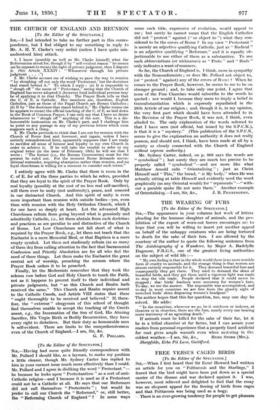THE CHURCH OF ENGLAND AND REUNION [To the Editor of
the SPECTATOR.] had intended to take no further part in this corres- pondence,. but I feel obliged to say something in .reply to Mr. A. IL T. Clarke's very unfair (unleis I have quite mis- understoOd him) attack.
1. I know (possibly as well as Mr. Clarke himself) what the Reformation stood for, though if by " self-evident ,reason " he means (as he appears-to /bean) the right of private judgment, then I dispute it (See Article XXXIV " Whosoever through his private
judgment ... . .") -
2. Mr. Clarke accuses me of wishing to paye the way to reunion " by sloughing off not only the word ' Protestant,' but the doctrines that stand behind it." To which I reply : (a) It is impossible to " slough off " the name of " Protestant," seeing that the Church of England has never adopted it (however fond individual persons may be of applying it to that Church). The Prayer Book tells us that the C. of E. is Catholic. Her members are, therefore, English Catholics,' just as those of the Papal Church are Roman Catholics ; (b) If by " the doctrines that stand behind it," Mr. Clarke means (as he appears to mean) the official teaching of the C. of E. as laid down in the Book of Common Prayer, I can only say that I have no desire whatsoever to " slough off ' anything of the sort. This is a dis- honourable insinuation on Mr. Clarke's part, and I challenge him to point to any passage in any of my previous letters which even suggests such a thing. 3. Mr. Clarke pretends to think that I am out for reunion with the Church of Rome first and foremost, and (again, unless I have entirely misunderstood him), apparently supposes that I am ready to sacrifice all sense of honour and loyalty to my own Church in order to achieve it. If he will take the trouble to refer to my original letter (in the issue of February 15th) he will see that I wrote : " The former (i.e., the Roman Communion) must for the present be ruled out. For the moment Rome demands uncon- ditional surrender, requiring absorption rather than reunion, and no loyal churchman is willing for a moment to consider such terms."
I entirely agree with Mr. Clarke that there is room in the C. of E. for all the three parties to which he refers, provided that they are loyal to the spirit of the Prayer Book. Only by real loyalty (possibly at the cost of no less real self-sacrifice), will there ever be unity (not uniformity), peace, and concord in our distracted Church. And this spirit of unity is even more important than reunion with outside bodies—yes, even than with reunion with the Holy Orthodox Church, which I for one have so deeply at heart. Let the advanced High ChUrchmen refrain from going beyond what is genuinely and admittedly Catholic, i.e., let them abstain from such doctrines and practices as are peculiar to and distinctive of the Church of Rome. Let Low Churchmen not fall short of what is required by the Prayer Book, e.g., let them not teach that the Eucharist is a mere Memorial Meal, or that Baptism is a mere empty symbol. Let them not studiously refrain (as so many of them do) from calling attention to the fact that Sacramental Confession and Priestly Absolution are for all who feel the need of these things. Let them make the Eucharist the great central act of worship, preaching the sermon where the Prayer Book orders it to be preached.
Finally, let the Modernists remember that they took the solemn vow before God and Holy Church to teach the Faith, not as it happens to present itself to their individual and private judgments, but " as this Church and Realm hath received the same." This Church and Realm require assent to the Catholic Creeds, and Article VIII states that these " ought thoroughly to be received and believed." If, there- fore, the " extreme " clergymen of this school of thought find themselves unable to accept the teaching of the Creeds anent, e.g., the Incarnation of the Son of God, His Atoning Sacrifice, His Virgin Birth or Bodily Resurrection, they have every right to disbelieve. But their duty as honourable men is self-evident. There are limits to the comprehensiveness even of the Church of England.—I am, Sir, &c.
G. F. POLLARD.


































 Previous page
Previous page